Have you ever done something that annoyed someone without meaning to? Maybe a small habit of yours bothered a friend, family member, or coworker. It’s normal for us to sometimes irritate others without realizing it. But these small things can sometimes make relationships a bit tense. The good news is saying sorry can really help. Admitting that we’ve been irritating and apologizing is a big step in fixing things and making our relationships better again.
“The greatest remedy for anger is delay.”
– Seneca
In this blog post, we’re going to share lots of sorry messages for when you’ve accidentally irritated someone. Whether it’s something little, you do often or just a one-time thing that upsets someone, saying a sorry message for irritating can show you care and want to make things right. These messages are all about saying sorry in a way that’s real, fixing relationships, and showing you understand. Let’s look at how these apologies can help smooth over any annoyance and help us get along better with everyone around us.
You Might Also Like:
- SORRY MESSAGES FOR AN UNKNOWN PERSON
- SORRY MESSAGES FOR REPLYING LATE
- SORRY MESSAGES FOR RUDE BEHAVIOR
- SORRY MESSAGES FOR MISUNDERSTANDINGS
- SORRY MESSAGES FOR LATE DELIVERIES
Apologies for Insensitive Comments or Remarks
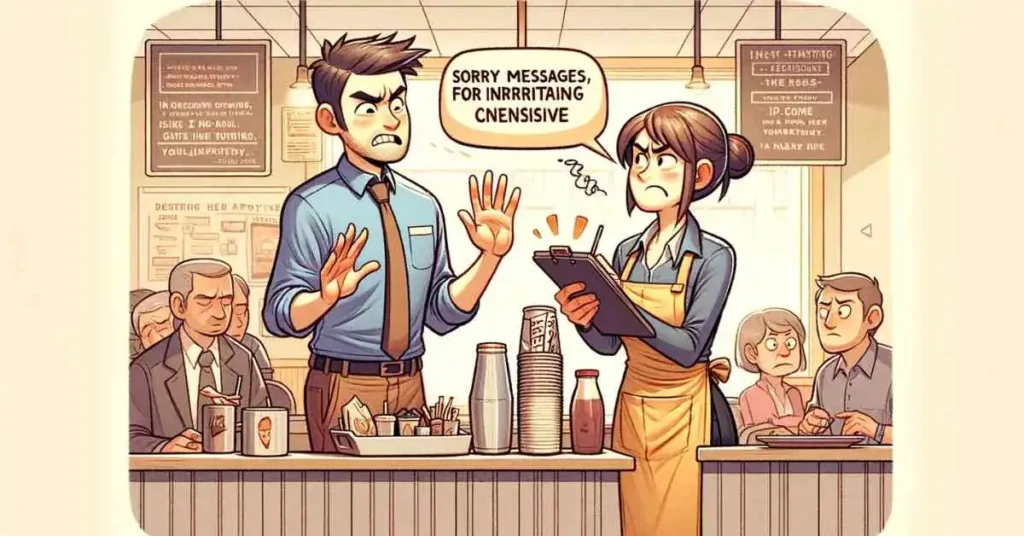
Sometimes, we say things without thinking about how they might hurt others. Here are 10+ ways to apologize for making insensitive comments or remarks:
“I’m sorry for the hurtful comment I made. It was thoughtless, and I regret any pain it caused. I’ll be more careful with my words in the future.”
“I apologize for my insensitive remark. I didn’t realize how it could hurt at the time, and I promise to be more considerate from now on.”
“Sorry for my sarcastic words. They were inappropriate, and I understand they might have caused discomfort. I’m committed to being kinder in my speech.”
“I regret the hurtful teasing. It wasn’t meant to be mean, but I see now that it was wrong. I’ll work on being more empathetic and sensitive.”
“I’m sorry for the insensitive joke I made. Humor shouldn’t hurt, and I apologize for crossing the line. I’ll be more thoughtful about others’ feelings.”
“I apologize for my thoughtless words. They were uncalled for, and I understand the hurt they caused. I’ll strive to be more respectful in my communication.”
“I’m sorry for my comment that came off as rude. I didn’t intend to be hurtful, and I’ll make sure to think before I speak in the future.”
“I regret any offense my words caused. Speaking without considering your feelings was a mistake, and I promise to do better.”
“Sorry for saying something so insensitive. I understand how hurtful it was, and I’ll work on being more compassionate and understanding.”
“I apologize for the hurtful remark. I didn’t think about how it could affect you, and I’ll be more mindful of my language from now on.”
“I’m sorry for the offense my words caused. I should have been more thoughtful, and I commit to improving how I communicate.”
In these apologies, it’s important to admit that what you said was hurtful, say you’re sorry for any pain caused, and promise to be more thoughtful and kind in how you talk in the future.
Apologies for Inconsiderate Actions or Disruptive Behavior
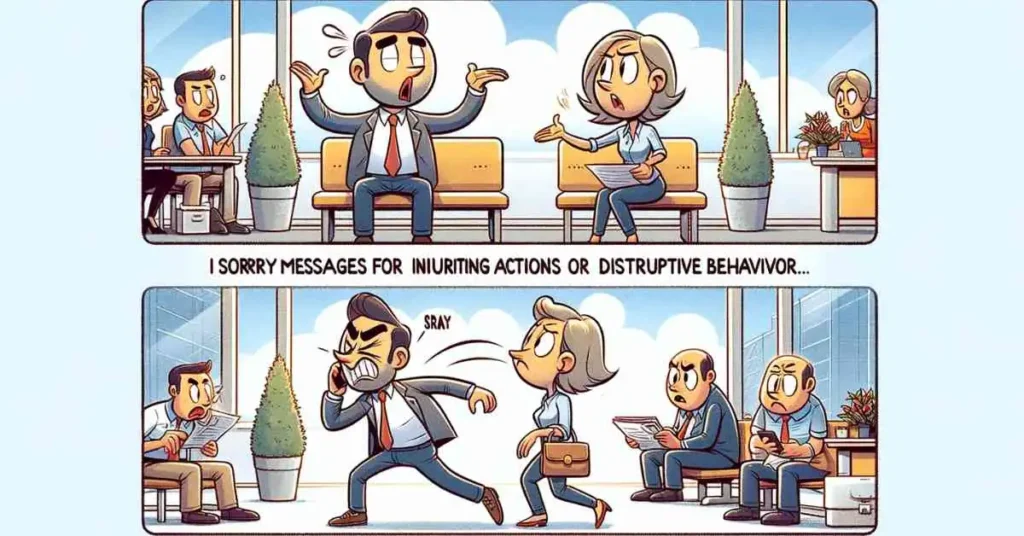
Inconsiderate actions can easily annoy or upset others. Here are 10+ ways to say sorry for such behavior:
“I’m sorry for interrupting you earlier. It was inconsiderate, and I regret any annoyance it caused. I promise to listen more and speak at the right time.”
“I apologize for my dismissive gesture. It wasn’t respectful, and I understand if it upset you. I’ll be more mindful of my actions in the future.”
“Sorry for not following proper etiquette. I realize now that it was rude, and I’ll make sure to be more considerate from now on.”
“I regret being inconsiderate with my actions. It wasn’t appropriate, and I apologize for any inconvenience I caused.”
“I’m sorry for my disruptive behavior. It was thoughtless, and I understand if it bothered you. I’ll work on being more respectful.”
“I apologize for not being considerate of your feelings. It was wrong, and I promise to treat you and others with more respect.”
“Sorry for my thoughtless actions. I didn’t realize how they might affect you at the time, and I’ll be more aware in the future.”
“I regret any disturbance I caused. It was inconsiderate, and I apologize. I’m committed to being more mindful of others around me.”
“I’m sorry for my behavior that came off as rude. I didn’t intend to be disrespectful and’ll strive to improve my social manners.”
“I apologize for not being more thoughtful in my actions. I understand now that they were disruptive, and I’ll be more respectful going forward.”
“Sorry for any inconvenience my inconsiderate behavior caused. I didn’t think about how it might affect you, and I’ll work on being more considerate.”
In these apologies, it’s key to admit that your actions were inconsiderate, say you’re sorry for any trouble caused, and show that you’ll try to be more respectful and thoughtful in the future.
Apologies for Negativity or Complaining
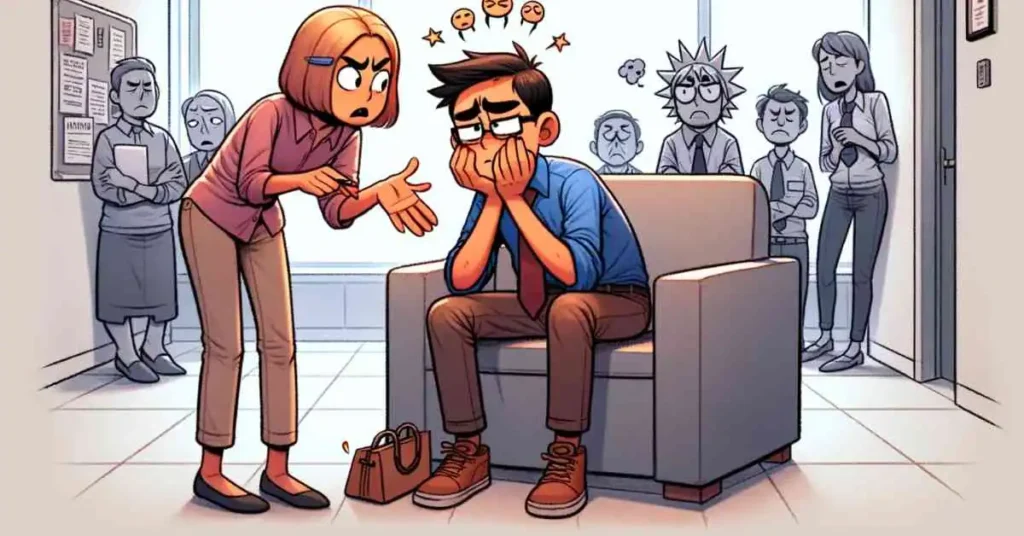
Being too negative or complaining a lot can bring others down. Here’s how to say sorry for such behavior:
“I’m sorry for being so negative recently. I didn’t realize how much it was affecting the mood. I’m working on adopting a more positive outlook.”
“I apologize for constantly complaining. It wasn’t helpful or uplifting, and I regret if it frustrated you. I’ll focus on being more optimistic.”
“Sorry for bringing down the mood with my pessimism. It wasn’t my intention, and I’ll try to be more upbeat and encouraging.”
“I regret the negativity I’ve been spreading. It’s important to stay positive, and I apologize for any gloom I caused.”
“I’m sorry for my habit of complaining. I understand it can be draining, and I’m committed to focusing on the positives instead.”
“I apologize for the pessimistic vibe I’ve been giving off. I’ll work on seeing the brighter side and sharing more positive thoughts.”
“Sorry for being a downer lately. I didn’t mean to dampen the spirits, and I’ll strive to bring more positivity to our interactions.”
“I regret letting my negative thoughts take over. I realize now the impact it had, and I’m dedicated to being more cheerful and hopeful.”
“I’m sorry for my tendency to complain. It’s not a good habit, and I’ll make an effort to express gratitude and positivity instead.”
“I apologize for any frustration my negativity caused. It wasn’t constructive, and I’ll work on being more uplifting and supportive.”
“Sorry for any discomfort my pessimism might have caused. I see now that it’s important to stay positive, and I’ll try to be more optimistic.”
In these apologies, it’s essential to recognize the impact of your negative behavior, express genuine regret for any annoyance or frustration caused, and show a commitment to being more positive and optimistic in your interactions.
Acknowledging the Value of Respectful Interactions

Treating people with respect and kindness is important in our relationships. Here are some ways to talk about the importance of being respectful:
“I believe in treating everyone with respect and kindness. I’m committed to making sure my words and actions show consideration and empathy to others.”
“Respectful communication is key in any relationship. I want to make sure I always speak and act in a way that shows respect and understanding.”
“Creating a positive environment is important to me. I’ll work on being more respectful and considerate in my interactions to help make this happen.”
“I value respectful behavior and want to make sure I’m always treating others well. It’s a big part of building strong and healthy relationships.”
“I aim to create a harmonious atmosphere around me. This means being respectful and empathetic in my conversations and actions.”
“Being considerate and respectful is something I strive for. It’s important for making sure everyone feels comfortable and valued.”
“I want to nurture my relationships with respect and kindness. It’s key to making sure we all get along well and support each other.”
“Respect is a foundation of good interactions. I’m dedicated to showing respect in all my conversations and behaviors.”
“Creating a positive and respectful environment is my goal. I believe it helps everyone feel more connected and happy.”
“I’m committed to respectful and considerate communication. It’s essential for building trust and understanding in any relationship.”
“I value the role of respect in interactions. I’ll focus on being empathetic and respectful to help create a more positive experience for everyone involved.”
In these messages, it’s good to talk about how treating others with respect and empathy is crucial for building and maintaining positive relationships. Being respectful in how we talk and act helps create a friendly and supportive atmosphere.
Reaffirming Commitment to Personal Growth
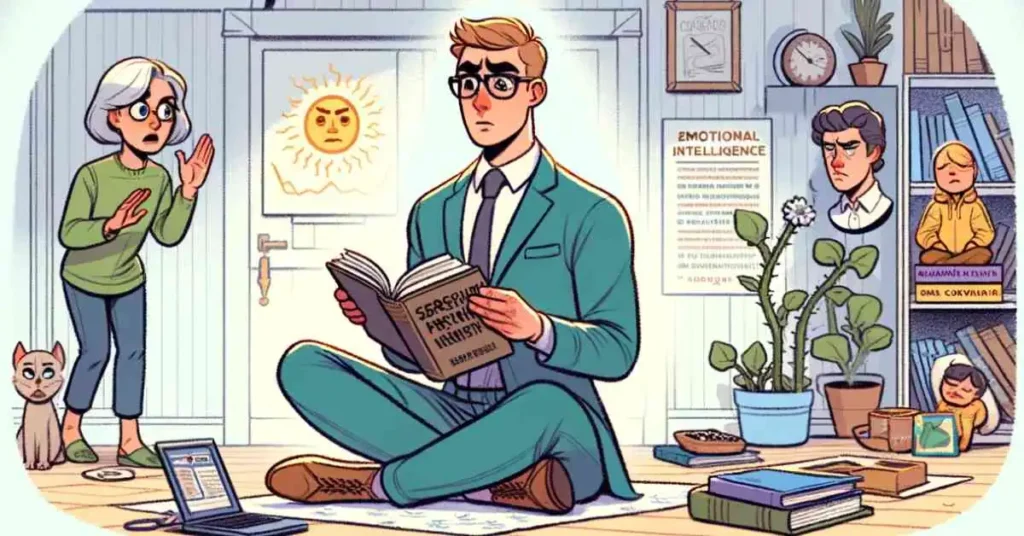
Growing as a person is important for having good relationships. Here are some ways to show you’re committed to personal growth:
“I’m dedicated to self-reflection and finding ways to grow. I want to learn from my mistakes and become a better communicator and friend.”
“I commit to improving myself, especially in talking to and understanding others. It’s important for building stronger, more caring relationships.”
“I believe in constantly growing and learning. I’m working on being more empathetic and understanding in my interactions.”
“I know there’s always room to grow. I’m focusing on bettering myself so I can be a kinder and more thoughtful person in my relationships.”
“Personal growth is a key part of my life. I want to learn from my experiences and be a better listener and friend.”
“I’m committed to developing greater empathy. Understanding others better will help me build more meaningful connections.”
“Growing as a person is important to me. I’m working on improving my communication skills and being more considerate of others.”
“I’m focused on personal development. It’s key to having good relationships and being supportive and understanding.”
“I believe in learning from my interactions. I’m committed to growing and being more aware of how I affect others.”
“I’m dedicated to being a better person every day. This means being more patient, understanding, and kind in all my relationships.”
“Improving myself is a priority. I want to be the best version of myself, which means being more understanding and empathetic to those around me.”
In these messages, it’s good to talk about how being willing to look at yourself and grow is important for having better relationships and learning from mistakes, improving how you talk to others, and being more understanding to help build stronger connections with people.
Seeking Forgiveness and Building Trust

Forgiveness is key in fixing relationships after we’ve been irritating or upsetting. Here’s how to express the desire to seek forgiveness and rebuild trust:
“I understand how important forgiveness is in mending our relationship. I’m truly sorry for my irritating behavior and hope you forgive me to restore harmony.”
“I sincerely seek your forgiveness for the annoyance I caused. I’m committed to making amends and improving my behavior for a stronger bond between us.”
“I apologize for my past mistakes and hope you can forgive me. Trust is important, and I’ll work hard to rebuild it with you.”
“I realize that seeking forgiveness is a key step towards fixing our relationship. I’m sorry for any irritation I caused and want to make things right.”
“I ask for your forgiveness for my irritating actions. It’s my hope that we can move past this and rebuild a more understanding and trusting relationship.”
“Forgiveness can help us move forward. I’m deeply sorry for my behavior and am ready to do what it takes to rebuild our connection.”
“I understand the value of forgiveness in healing relationships. I’m truly sorry and hope we can work together to strengthen our bond.”
“I apologize and seek your forgiveness for the times I’ve been irritating. I’m committed to learning from this and building a more fulfilling relationship with you.”
“I’m asking for your forgiveness for my past behavior. I believe it’s the first step towards rebuilding trust and improving our relationship.”
“I hope you can forgive me for any irritation I caused. I’m eager to rectify my mistakes and work on creating a stronger, more positive connection.”
“Forgiveness is powerful in restoring harmony. I sincerely apologize for my actions and hope we can move forward with a stronger, more trusting relationship.”
In these apologies, it’s important to express your understanding of the importance of forgiveness in repairing relationships, show genuine remorse for irritating behavior, and demonstrate a willingness to make amends and improve your interactions. Seeking forgiveness is key to reconciliation and building stronger, more fulfilling relationships.
Closing Notes
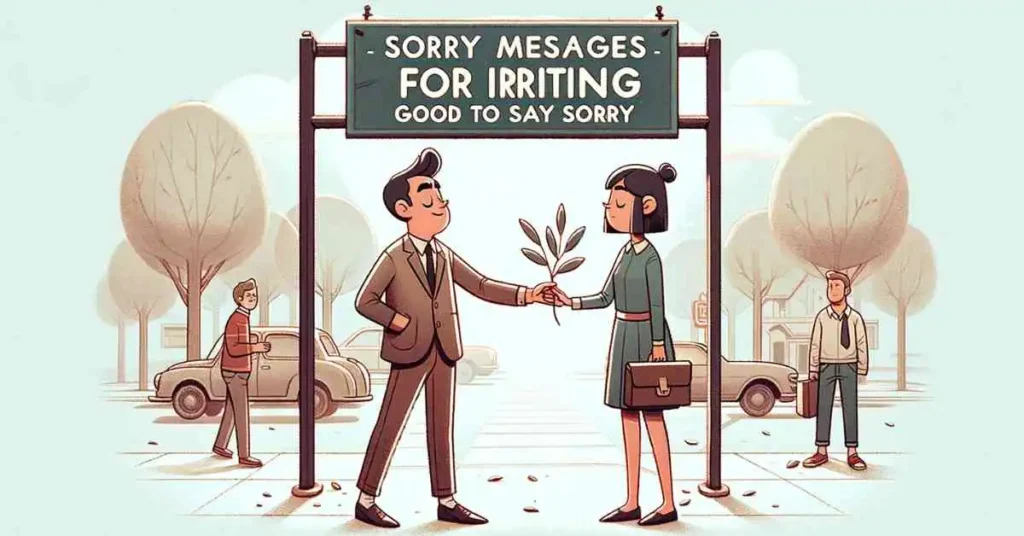
Being honest, knowing when we make mistakes, and really wanting to get better is very important when we’ve been annoying or irritating. It’s good to say sorry, ask for forgiveness, and try to be better in how we act and talk with others. This helps make our friendships and other relationships stronger.
Thanks for reading these sorry messages. We hope they help you if you ever need to say sorry for being irritating. Remember, a good, sorry message for irritating, understanding how we affect others, and wanting to be better is important for keeping our relationships healthy and strong. We’re happy to share these messages and hope this blog post helps anyone who wants to fix their relationships with kindness, understanding, and a promise to improve themselves.









